Global Down Syndrome Foundation announces new collaboration for groundbreaking Down syndrome – Alzheimer’s disease research project
October 18th, 2017 by Global Down Syndrome Foundation
$2.5 million initial commitment to launch project
DENVER –The Global Down Syndrome Foundation today announced that Biogen, a neuroscience leader has joined the Global Down Syndrome Foundation and the University of Colorado School of Medicine in a groundbreaking project that explores the connection between Alzheimer’s disease and Down syndrome.
The Crnic Institute Human Trisome ProjectTM (HTP) is an ambitious longitudinal and cross-sectional study that will recruit 1,000 individuals with Down syndrome (also known as Trisomy 21) and 500 typical individuals. Scientists and clinicians will sequence and study several layers of genomics information (all de-identified) from a single sample of blood. Saliva, stool and other samples are also being collected. The Crnic Institute HTP has already begun to significantly increase the speed of Down syndrome research and has enrolled nearly 300 participants in the first 11 months.
“People with Down syndrome have a different disease spectrum,” said Dr. Joaquín Espinosa, executive director of the Crnic Institute, and the principal investigator of the Crnic Institute HTP. “The Crnic Institute HTP will allow us to redefine Down syndrome from the least scientifically understood condition to one of the best understood conditions. In addition, it will provide unprecedented understanding of Alzheimer’s disease, autoimmune conditions, cancers and other medical conditions that people with Down syndrome are either very predisposed to or protected from, eventually enabling the development of new diagnostic and therapeutic tools.”
“This research will serve first and foremost people with Down syndrome, but also the millions of individuals without Down syndrome who are affected by the many medical conditions modulated by trisomy 21,” said Espinosa.
Biogen has committed more than $500,000 and additional in-kind resources to the Crnic Institute HTP to investigate the genome and epigenome of specific cell types in the blood that could inform the development of Alzheimer’s disease. This initial investment is being financed with funds from Biogen and $1 million from the University of Colorado School of Medicine at the Anschutz Medical Campus – home to the Linda Crnic Institute for Down Syndrome – with a matching gift of $1 million from the Global Down Syndrome Foundation.
“Down syndrome is still one of the least funded genetic conditions of the federal government, so we are extremely grateful for the commitment from CU and Biogen,” said Michelle Sie Whitten, president & CEO of the Global Down Syndrome Foundation. “This is just the beginning as we hope to attract other biopharmaceutical organizations and philanthropists committed to improving the lives of people with Down syndrome and other conditions.”
“The School of Medicine provides a home for outstanding biomedical research that leads to improved care for all,” said Dr. John J. Reilly, Jr., vice chancellor for health affairs and dean of the University of Colorado School of Medicine. “We are confident that this investment will have a significant impact on our understanding of the health of people with Down syndrome and that it will lead to discoveries informing the care we provide.”
“Our son is 38 years old and we are concerned that he may get Alzheimer’s,” said Jack and Penni Dorwart, whose son participated in the Crnic Institute HTP. “We also know that if we have high- quality research that there is the potential to significantly improve not only our son’s life but millions of others with Down syndrome who have many other medical issues that prevent good quality of life. That is why we participated in this study and we encourage others to do the same. We are grateful to the Crnic Institute and the Global Down Syndrome Foundation for taking on this difficult work and advocating for our children and adults.”
Learn more about in the Crnic Institute Human Trisome ProjectTM or sign up to participate in the study.
Global Down Syndrome Foundation responds to CBS story on Iceland’s ‘eradication’ of Down syndrome
August 16th, 2017 by Global Down Syndrome Foundation
DENVER
Michelle Sie Whitten, President and CEO of the Global Down Syndrome Foundation released the following statement today regarding the recent CBSN story on ‘eradicating’ Down syndrome in Iceland:
“It’s heartbreaking to see what is happening in Iceland today, and shocking to see that this level of misinformation and discrimination against people with Down syndrome still exists. While every mother and every pregnancy is unique, the fact is those born with Down syndrome can and do live long, happy and productive lives. Women making these critical decisions need to have the facts.
Educating the medical community and pregnant women with accurate and current information about Down syndrome is imperative. Global Down Syndrome Foundation and the National Down Syndrome Congress recently updated their Prenatal Testing Pamphlet for pregnant women and health providers about what to expect with a prenatal diagnosis of Down syndrome. This information is free and available in English and Spanish.
The situation in Iceland is a reminder of how important it is that Global continues to invest in medical care, education and advocacy, and that we continue to advance the world class research that is helping us better understand Down syndrome,” said Whitten.
In addition, below are specific facts about the condition in the United States:
- Lifespan – Today, the average lifespan of a person with Down syndrome is nearly 60 years.
- Termination Rates – The best available statistics in the U.S. are that an estimated 67 percent of women who receive an amniocentesis resulting in a positive test result for Down syndrome choose to terminate their pregnancies. But over 95 percent of pregnant women don’t even elect to receive an amniocentesis.
- Medical Care & Research – There have been great strides in medical care and research that have doubled the lifespan of people with Down syndrome over the last 30 years.
- Educational Opportunities – People with Down syndrome are included in public schools. Many complete high school, and increasing numbers are going to college or get vocational training.
- Voting & Employment – Many people with Down syndrome work, volunteer and vote.
- Marriage, Siblings & Self-advocates – Despite potential challenges, personal accounts and studies show most families that have a child with Down syndrome are stable, successful and happy, and that siblings often report having increased levels of compassion and empathy. One major study on marriages and Down syndrome shows that the divorce rate among parents of children with Down syndrome is lower than the national average.
For the most current, accurate information and resources associated with people with Down syndrome visit www.globaldownsyndrome.org/facts.
Global Down Syndrome Foundation Urges U.S. Senate To Maintain Important Patient Protections and Coverage As Part Of Health Reform Plan
June 26th, 2017 by Global Down Syndrome Foundation
Global Down Syndrome Foundation (Global) is a nonpartisan, leading research, medical care and advocacy organization for people with Down syndrome. Global believes strongly that all Americans, including members of our community, must have access to affordable, high-quality healthcare and health insurance coverage appropriate for their needs. Global urges Senators to keep key patient protections and health insurance coverage that are part of current law in any Affordable Care Act (also known as Obamacare) replacement bill that is considered by the Senate.
We encourage the Senate to:
- Ensure that people with pre-existing conditions like Down syndrome continue to have access to affordable, high-quality health insurance – regardless of whether or not they currently have insurance;
- Protect federal funding for Medicaid to ensure that people who received coverage under previous expansions won’t lose their insurance;
- Remove caps on federal contributions to state Medicaid programs – caps could result in persons losing coverage or those maintaining Medicaid coverage seeing a reduction in covered medical services and higher out-of-pocket costs; and
- Continue the Affordable Care Act provision that allows children up to age 26 to stay on their parents’ health insurance policies.
Time is of the essence – the Senate may hold a vote on this legislation this week. We urge all Global Down Syndrome Foundation advocates to contact your Senators immediately and urge the Senate to allow for a full and open debate on their healthcare proposal and to oppose any plan that removes current patient protections and coverage for individuals with Down syndrome. As the debate on health care reform continues, Global is engaged with our friends in Congress to protect the health and wellbeing of all individuals with Down syndrome.
Thank you for your advocacy and support!
Corresponding Phone Script:
“Hi. My name is _________ and I live in [Hometown, State].
“I’m a volunteer and advocate with the Global Down Syndrome Foundation. I am deeply concerned that the Senate version of the American Health Care Act will not include protections that are important for people with Down syndrome. In particular, I am concerned that this bill [1) doesn’t guarantee insurance coverage for people with preexisting conditions, 2) cuts federal funding for Medicaid expansion, 3) establishes caps on federal funding for Medicaid, and/or 4) would not allow people to stay on their parents’ health insurance plans up to age 26 – include one or more based on your specific concerns].
“I am also concerned that the public will not have enough time to review and provide feedback on this bill. I hope Senator ____ will work with [his/her] colleagues to make sure that there is ample time for debate and input on this bill.
“These healthcare protections are extremely important not only for people with Down syndrome, but for all Americans.
“Thank you.”
Global researches anchor T21RS International Conference
June 12th, 2017 by Global Down Syndrome Foundation
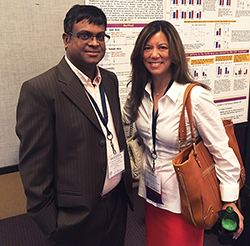 Global Down Syndrome Foundation is a founding member of the T21 Research Society. The Society is the first non-profit scientific organization of researchers studying Down syndrome, founded to promote basic and transnational research on Down syndrome and to apply new scientific knowledge to develop improved treatments and cures. After hosting a successful first conference in Paris, the society hosted a second conference in Chicago from June 7th to 11th. A number of Global affiliated scientists and scholars were invited to present their groundbreaking research:
Global Down Syndrome Foundation is a founding member of the T21 Research Society. The Society is the first non-profit scientific organization of researchers studying Down syndrome, founded to promote basic and transnational research on Down syndrome and to apply new scientific knowledge to develop improved treatments and cures. After hosting a successful first conference in Paris, the society hosted a second conference in Chicago from June 7th to 11th. A number of Global affiliated scientists and scholars were invited to present their groundbreaking research:
Joaquin Espinosa, PhD
Associate Director for Science at the Global affiliated Linda Crnic Institute for Down syndrome
Understanding Down syndrome as an Interferonpathy: Espinosa’s explains the implications for the understanding of leukemia and other co-morbidities driven by trisomy 21
Ann-Charlotte Granholm-Bently, PhD
Researcher for the Down Syndrome-Alzheimer’s Disease Investigator program powered by Global, Linda Crnic Institute and the National Alzheimer’s Association
Novel mechanisms in Down syndrome pathophysiology: Designer receptors reveal an important role for noradrenergic systems in Down syndrome pathology
Roger Reeves, PhD
T21 President and a member of the Scientific Advisory Board for the Linda Crnic Institute for Down Syndrome
Breakthrough and oral communication sessions: Reeves lecture focuses on a specialized pro-resolution mediator approach to chronic inflammation in the Ts654Dn mouse model of Down syndrome
Katherine Waugh, PhD
Postdoctoral Fellow for the Crnic Institute
Flash Poster Presentation: Waugh’s presentation includes extensive perturbations of the immune system among individuals with Trisomy 21
Michelle Sie Whitten
Global President and CEO
Medical Policies for people with Down syndrome: Whitten discusses medical care for adults with Down syndrome and lifting barriers
Donna Willcock, PhD
Researcher for the Down Syndrome-Alzheimer’s Disease Investigator program powered by Global, Linda Crnic Institute and the national Alzheimer’s Association
Biomarkers of Alzheimer’s disease in Down syndrome: Wilcock shares how individuals with Down syndrome who have Alzheimer’s disease have a distinct neuroinflammatory phenotype compared to sporadic Alzheimer’s disease
Because Down syndrome research has generated findings that affect thinking regarding research on Alzheimer’s disease and solid tumor cancers, T21RS creates another forum for drawing attention to the need for further funding for Down syndrome research, which could in turn benefit everyone’s lives. Global and the Crnic Institute are at the forefront of this research and look forward to helping place a greater emphasis on collaborations worldwide.
The conference that presents the latest scientific developments in the field of Down syndrome research is powered by a dynamic team of scientists, researchers, and scholars from across the world:
Conference Organizers:
Roger Reeves, PhD
Johns Hopkins University School of Medicine
Jean Delabar, PhD
CNRS-ICM
Mara Dierssen, MD, PhD
CRG-Center for Genomic Regulation
John O’Bryan, PhD
University of Illinois Chicago
Scientific Program Committee:
Mara Dierssen, MD, PhD- Chair
CRG-Center for Genomic Regulation
Anita Bhattacharyya, PhD
University of Wisconsin-Madison
Cynthia Lemere, PhD
Harvard Medical School
Jean Delabar, PhD
CNRS-ICM
Dean Nizetic, MD, PhD
Nanyang Technological University Singapore
Jorge Busciglio, PhD
University of California-Irvine
Nicole Schupf, PhD, DrPH
Columbia University Medical Center
Pablo Caviedes, MD, PhD
University of Chile
Deny Menghini, PhD
Bambino Gesu Children’s Hospital
For more info on T21RS, visit T21RS.org.
Global Employment Grant Winners thriving in communities across US
May 16th, 2017 by Global Down Syndrome Foundation
Down Syndrome Association of Wisconsin (DSAW)
Down Syndrome Connection of the Bay Area
GraceSigns
The Up Side of Downs of Northeast Ohio (USOD)
Initiated in 2016, Global Down Syndrome Foundation’s Self-Advocate Employment Initiative Grants have empowered local Down syndrome organizations to help hire 32 individuals with Down syndrome. The accomplishments of the organizations and the individuals they employ are creating significant impacts in their communities across the nation.
Global is so proud to be able to support these wonderful member organizations through the Employment Grants. The Grants will be offered again next year and applications will open in December 2017. Eligibility to receive an Employment Initiative Grant is just one of the benefits of Global membership.
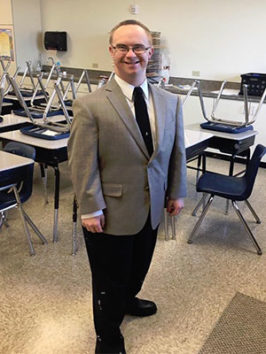
Down Syndrome Association of Wisconsin (DSAW)
In 2016 DSAW used the funds from Global’s grant to support Andrew’s Voice— a business run by Andrew Gerbitz, a Self-Advocate, that brings Down syndrome awareness, mentoring, and self-advocacy to different communities. Andrew’s Voice allows Andrew the opportunity to make a job out of something he loves to do, speak in public on behalf of those impacted by Down syndrome.
Andrew shares his excitement to be involved with these presentations:
“I love DSAW because they do so many amazing things for my life. DSAW helps me with my business, Andrew’s Voice, like at the Milwaukee County Zoo when I got to share about my business. I like doing the Peer Sensitivity Trainings and being a motivational speaker to teach other people that we are more alike than different. Going to schools to speak is fun especially because I like working with kids. Speaking at the Golf Outing was a huge success. It is a great to be with other self-advocates. Going to La Crosse to speak was another good memory. Helping with DSAW is fun because I get to hang out with my friends and other self-advocates. I like to be a good role model and help others. Being on the DSAW board is very important to me and helping out with DSAW events”— Andrew Gerbitz.
Down Syndrome Connection of the Bay Area
After a successful first grant year, Down Syndrome Connection of the Bay Area (DSCBA) will employ several self-advocates. Support from Global in 2016 allowed four associates to grow their professional and personal skills. In 2017 the grant will continue to enable the initial four employees expand their responsibilities, in addition add a fifth employee.
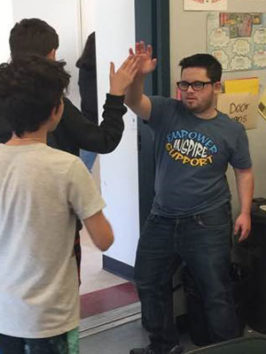
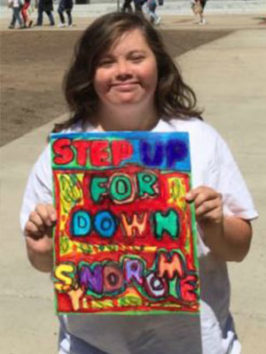
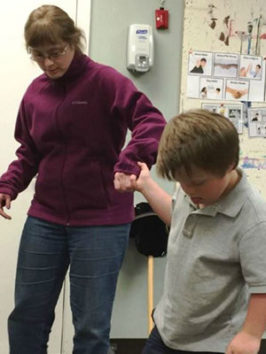
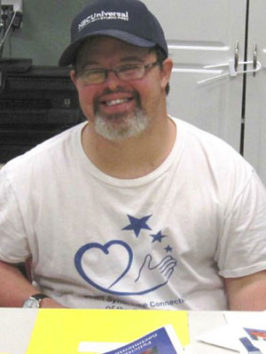
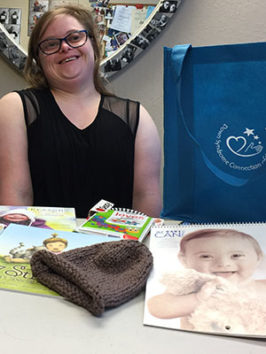
- In 2016 Eli conducted 22 ability awareness presentations in Bay Area schools reaching more than 1,000 students and nearly 70 adults – throughout different grade levels – who have a classmate with Down syndrome. As the Ability Awareness Associate, Eli’s new tasks will include participating in some DSCBA support groups and supporting the technology portion of his awareness presentations.
- Not only did Marissa become more engaged in her role as an ambassador, but she became a master of public engagement through PowerPoint presentations and visual cues. In 2017, as the Community Outreach Associate she will create a social media campaign to give her the opportunity to use her voice creatively.
- Gaining more independence in her job tasks is one of the biggest accomplishments K. Leigh gained as the DSCBA Assistant Teacher. K. Leigh’s new tasks include leading circle time with kids, and she will be assigned specific children who she can provide one-on-one support to.
- Joseph, the Administrative Assistant, took initiative in 2016 by seeking assistance when he was stuck on tasks— like preparing mailers and medical outreach packets. As Joseph’s confidence continues to grow in 2017 his new tasks will include increasing his efficiency and being able to accept coaching from co-workers in a constructive and professional manner.
- The grant money was so helpful DSCBA was able to add a fifth employee— Malia— to their staff in 2017. Malia reports directly to DSCBA Director of New Family Services, Nancy Ferguson, and she is responsible for assembling the organizations new parents packs and with materials as needed.
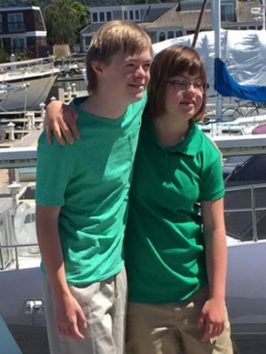
GraceSigns
GraceSigns is making major strides in communication opportunities for kids with and without disabilities. The mission of the non-profit is to teach sign language in a way that is easy, accessible, and fun! Photos taken at a GraceSigns filming session for the Sign Me a Song Project show how busy the organization is in fulfilling this mission.
With Global’s grant the organization has expanded and continue their subcontract with Futures Explored, Inc.—an organization that employs adults with developmental disabilities. Futures Explored helps with the production and filming of GraceSigns’ signing videos and hires adults with Down syndrome to assist with camera work, sound set up, and videotaping.
Sign Me A Song, like GraceSigns first app Sign Me A Story, embeds sign language into stories and songs— a learning technique GraceSigns founder Valerie R. Carter believes is a more successful approach in teaching sign language.
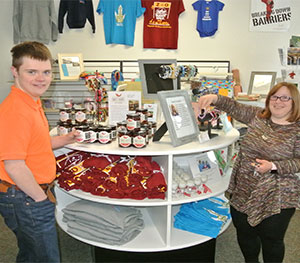
The Up Side of Downs of Northeast Ohio (USOD)
Global’s grant played an instrumental role in helping the Up Side of Downs of Northeast Ohio blossom in the Independence, OH community— and will continue to in 2017.2016 was a banner year for USOD, and Global is thrilled to have supported their growth. Carrie is an Office Assistant with USOD who helps with data entry, builds new parent packets, and prepare for events and USOD’s learning program. In May 2016 Carrie’s duties expanded to handling inventory when USOD opened their unique gift shop filled with treasures created by individuals with Down syndrome, Artful 21. With the success of Artful 21, USOD hired two additional self-advocates — Tiffany and Shira.
“I learn so much from this job. I like the computer, data entry work. I like doing any tasks that I am given. I support the Up Side of Downs because I have Down syndrome,” Carrie said. “Mine was one of the original families and I feel attached in a way to the Up Side of Downs. I never thought I’d be working here and I’ve been here two years. It’s the best. I learn from everyone here. Working on the computer here has helped me with my other job at the Cleveland Clinic.”
Global Down Syndrome Foundation Shares Concerns on Latest Obamacare Repeal and Replace Legislation
May 1st, 2017 by Global Down Syndrome Foundation
People with Down syndrome and their families are Republicans, Democrats, and Independents. As a nonpartisan, leading research and advocacy organization, the Global Down Syndrome Foundation (Global) is focused on protecting and furthering the rights of people with Down syndrome regardless of party. To this end, we are deeply engaged with developments associated with health care reform, and we are providing an update to our friends and supporters on how this legislation may impact individuals with Down syndrome, how our community can participate in this national debate and take action.
Several weeks ago, President Trump, House Speaker Paul Ryan and other Republican leaders introduced the American Health Care Act (AHCA) to repeal and replace major pieces of the Affordable Care Act also known as Obamacare. The President could not garner enough votes within the Republican Party to pass the AHCA in the House. However, the President and his administration along with several members of Congress have continued negotiating further modifications to this legislative proposal and it is possible that the House of Representatives will schedule a vote as early as this week.
Global is encouraged that certain Obamacare provisions have been retained by the new proposal such as parents being allowed to keep their children up to age 26 on their health insurance policy. However, as the newly negotiated proposal stands, Global is concerned that there is not enough protection for people with pre-existing conditions. Given that Down syndrome may be considered a pre-existing condition by many health insurers and given the prevalence of other pre-existing conditions like certain cancers, and diabetes among individuals with Down syndrome, the importance of this issue cannot be overemphasized.
In particular, we respectfully urge our President and Congress to not include state waivers that would allow health insurers to charge much higher premiums to Americans with pre-existing conditions. We also oppose elimination of the “essential health benefits” requirement meaning health plans could discontinue coverage for many crucial medical services.
If you share these concerns, or have other concerns, please contact your local U.S. Representative and let them know that these areas of health care should not be sacrificed and that the most vulnerable Americans need protection.
As Congress continues debate on health care reform, Global is dedicated to working with our friends on both sides of the aisle, and with our Down syndrome and differently-abled communities, to ensure that people with Down syndrome continue to have access to affordable, quality health insurance.
Thank you for your advocacy and support!
Want to reach out to your U.S. Representatives to voice your concerns? Here’s a script to follow if you do contact them:
“Hi. My name is _________ and I live in [Hometown, State]. I’m a constituent and Global Down Syndrome Foundation advocate. My mailing address and/or email address is _______________ so that you can send me a response to my call.
I understand that the House of Representatives is considering legislation that would make changes to the patient protections in the Affordable Care Act.
I am particularly concerned about a provision in the legislation that would allow health insurers to charge much higher premiums to Americans with pre-existing conditions.
Some health insurance plans consider Down syndrome to be a pre-existing condition. Additionally individuals with Down syndrome have a much greater chance of having other pre-existing conditions like cancer, heart disease, and diabetes.
I am also deeply concerned that the bill would eliminate the “essential health benefits” requirement meaning health plans could discontinue coverage for many crucial medical services.
Please tell the Representative about these concerns and ask that they refrain from passing health reform legislation that eliminates these important patient protections and limits the scope of medical services available to our community.
Thank you.”
Global sending best of luck to models in Second Annual Sea Bunita Sea Bo Mes !
April 30th, 2017 by Global Down Syndrome Foundation
Global sends congratulations to all the models, organizers, and self-advocates in Aruba for the second annual Sea Bunita Sea Bo Mes!
Two of the models who will be rocking the runway in Aruba this year were also models at Global’s Be Beautiful Be Yourself Fashion Show! We wish the best of luck to Jake, Shawndré, and to all of the other models in this year’s fashion show.
We are honored to have been invited to the event. Global is busy preparing for a summer of advocating and financially supporting research and medical care for people with Down syndrome, which has prevented us from attending. In our absence, President and CEO Michelle Sie Whitten offers words of encouragement and support for this amazing event in Aruba!
Since 2013, Hans Geerman, President and Director of the Fundación Sea Bunita Sea Bo Mes, has been working on the Dutch Caribbean island of Aruba to change the way people see individuals with Down syndrome.
“We started organizing different events to make the Aruban community more aware of integration and inclusion for people with Down syndrome,” Geerman said.
Originally, the foundation operated under the name Ban Papia,, which means “Let’s Talk,” until an influential trip to Denver to attend Global Down Syndrome Foundation’s 2015 Be Beautiful Be Yourself Fashion Show, where his son Shawndré modeled. The visit proved so inspirational that Hans decided to bring that experience back to the island.
“After the event, we returned to Aruba and sponsored the first Aruba fashion show as Fundación Sea Bunita Sea Bo Mes (Be Beautiful Be Yourself Foundation),” he said. “The show starred members of our community with Down syndrome as models and local business and media personalities as their escorts. The event was a sellout, and the feedback has been positive beyond what we could hope it would be.”
Middle school students team up with Global to advocate for the importance of Down syndrome research
March 20th, 2017 by Global Down Syndrome Foundation
Writing essays, calculating fractions, and studying history— these are what fill a typical middle-schooler’s day.
But, Wednesday afternoon seven middle-school students joined forces with Global Down Syndrome Foundation to work towards a goal: get signatures for Global’s Petition of Support for Down syndrome research. And, the young scholars more than accomplished this. For two hours, 6th, 7th, and 8th graders from Stanley British Primary School (BPS) gathered 185 signatures at Lowry Town Center. The students weren’t alone in their efforts. Global guided them, and 3 self-advocates palled up with the students— a collaboration that was helpful and fun for everyone involved.
This teamwork originates from Global CEO and President Michelle Whitten’s daughter, Sophia, who attends Stanley BPS. Sophia’s homeroom class decided to do a Service Learning Project to learn about Down syndrome and why research for it is so important. Sophia also happens to have Down syndrome.
The students were enthusiastic to have a hands-on approach to understanding more about Down syndrome. Prior to the petition signing the students wrote speaking notes and role-played to prepare. And, their preparation paid off. Overall, there were positive reactions and the people to turn down signing the petition were far and few.
The face-to-face interaction students and self-advocates had with the community was successful in helping Global gain strides to our overall goal of 5,000 signatures. While Global made leaps in the number of signatures, we are still short of our target. Now more than ever it’s important to show lawmakers their communities support Down syndrome research. Help us reach our goal so we can present a compelling petition in D.C. later this year!
Local media outlets highlighted the collaboration between Global and Stanley BPS to gain signatures. Whitten, Sophia , and Sophia’s classmate Addie Boyer all sat down with 9News to discuss the petition. Sophia and Addie explain why their class was involved in gathering signatures. You can watch the interview here!
Dr. Tom Blumenthal, executive director for the Linda Crnic Institute – a Global affiliate, and Whitten also discussed the importance of World Down Syndrome Day and the details of Global’s WDSD event on March 21 with CBS 4. You can watch the discussion here!
Colorado Governor, First Lady and Tennis Champion Support Global
September 15th, 2016 by Global Down Syndrome Foundation
Colorado Gov. John Hickenlooper and First Lady Robin Pringle Hickenlooper joined Mats Wilander, the former world No. 1 tennis player, at Global’s Dare to Play Tennis Camp Exhibition Day. The day was the culmination of a 6-week camp where athletes with Down syndrome and their typical peers learned the fundamentals of tennis.
A Global Bromance: J.R. Smith and Brad Hennefer
September 15th, 2016 by Global Down Syndrome Foundation
NBA Champion J.R. Smith and Global awardee Brad Hennefer’s longtime friendship is detailed in the Fall issue of Down Syndrome World™ magazine. The two athletes share how they inspire each other and how the public’s view of them isn’t always the most accurate.



 Experience our inspirational and groundbreaking videos and photos. Our children and self-advocates are beautiful AND brilliant!
Experience our inspirational and groundbreaking videos and photos. Our children and self-advocates are beautiful AND brilliant! Make sure your local Representatives are on the Congressional Down Syndrome Task Force.
Make sure your local Representatives are on the Congressional Down Syndrome Task Force.